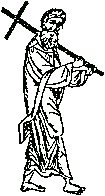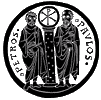 |
Athonite Confessor, |
Holy Mountain Athos, the great spiritual monastic republic, has served for a thousand years as a fortress of Orthodoxy. Monks of twenty great monasteries, a great many sketes, hermit's cells, and huts have struggled to preserve the holy traditions of the Church, and were ready to die to adhere to the Holy Orthodox Faith.
Thus in the thirteenth century many monks refused to recognize the union with the Roman Papacy to which the Patriarch of Constantinople, John Vekka, had submitted. For this stand, Roman Catholics subjected them to torture and death.
In the twentieth century, when patriarchs of Constantinople have repeated their rush to join ignominiously with the heretical west. Athonite monks also resisted them. When the Greek Church and the Patriarchate of Constantinople adopted the Gregorian (new style) calendar in 1924, many Athonite monasteries refused to accept it and stopped commemorating the patriarchate. Instead they threw their support to the "Old Calendarists" in Greece. Since all the higher clergy and the majority of priests of the Greek Church had gone over to the new style calendar in the early years of the schism, thousands of laymen who remained faithful to the old calendar were left without pastors. Athonite priestmonks were forced to leave Mt. Athos to help their brethren. One of them was Father Artemios Zenophotinos.
For more than thirty years, Father Artemios had lived in the monastery of Xenophont on Mt. Athos where he led an ascetic life and abode in silence. In 1924 after the introduction of the new calendar he ceased commemorating the patriarch who had embraced the new calendar. He left the monastery and moved to a hut in a skete where he stayed for three years. In 1927 he abandoned Mt. Athos and began to serve in different places throughout Greece.
In May 1934 Father Artemios was found on the island of Tinos. There he preached on the central square in the Church of the Icon of the Most Holy Theotokos of Tinos. When this was reported to the authorities,
Father Artemios received an "invitation" from the Tinos police, summoning him to appear before an episcopal commission to answer for his deeds: specifically, his attraction to the old calendar and his serving without the permission of the new calendar hierarch.
Father Artemios ignored these provocations, but in answer preached a fiery sermon concerning innovations from the ambon of the church.
In a few days he appeared at the police department where he was seriously warned that he would endanger his life if he did not leave the island immediately. The policeman, who was well informed of Father Artemios's activities on Tinos, advised him to leave the island quickly, since he could not guarantee his safety for any length of time.
The policeman had spoken the truth, for a few days later new-style agents dynamited Father Artemios's room. Father Artemios was miraculously saved by the Lord. After this attempt on the his life, the police took what they called appropriate measures to find the ringleaders of the attack by sealing off the church and ordering Father Artemios to leave Tinos.
Forced to abandon his mission on Tinos, Father Artemios left for Athens where he learned that they needed priests in Patrai. He went there to serve in the country church of Saint John the Forerunner where he confessed and instructed a large number of the faithful who came to him for spiritual counsel. He used his time well, carrying on edifying conversations with believers, the number of which grew from day to day with God's help.
In February 1935 Fr. Artemios was arrested and incarcerated in Levkadas prison. The True Ortodox Christian Newspaper, Propagation of Orthodoxy, on the first page of its February 25, 1935 issue, showed a picture of Fr. Artemios in prison. Under it was written:
The martyrdom of old-style priests. Priestmonk Artemios, who served in the monastery Vonitsas according to the traditional Orthodox ecclesiastical calendar, was arrested by order of the tyrant, Metropolitan of Akharnai Hierotheus, and is kept in the darkness of Levkadas prison for adhering to the old-style calendar.
On the Feast of the Holy Nativity of Christ in 1937, Father Artemios found himself back on Tinos to strengthen and encourage the local Christians whom he loved very much. Suddenly, however, on January 17, 1937 an emergency situation was artfully created, and Father Artemios was forced to leave the island. That is how dangerous Father Artemios had become for the New Calendarists.
In 1950 Archbishop Chrysostom of Florina sent Father Artemios to Partartima-Vion to preach to believers. Since Father Artemios was already in his declining years and was ill with diabetes, the newly-ordained Father Panaretos accompanied him to assist him in his new mission. In spite of his age, Father Artemios always had the strength to preach from the ambon. One Sunday after Vespers Father Artemios wanted to preach a sermon. He stood on a chair in the middle of the square and in a loud commanding voice began to speak about Orthodoxy. His unexpected appearance attracted many people who surrounded him and listened with interested attention. However, certain "priests" appeared who did not share Father Artemios's enthusiasm. They accused him of proselytism and forced him to leave. Soon thereafter Father Artemios was exiled to Mt. Athos.
Father Artemios often had to live in the homes of his spiritual children, where, as they relate, he was so simple and modest that they were often oblivious to his presence. He remained in his room and was completely absorbed in his prayers or reading. He fasted much, and when because of weakness he simply had to eat bread, he would say, "I will take one small piece."
When he became seriously ill in 1932, a doctor who had been called in ordered him to stop fasting. As if not understanding, Father Artemios craftily asked the doctor, "Should we be spending our time swallowing beans?"
Father Artemios never saved money for a rainy day. He possessed only enough as was required to support his flock. He had perfect faith in divine providence.
Many people recalled Father Artemios's pastoral care during the German occupation of Greece and the great famine. As soon as he received a little bread, he hurried to put it in the mouths of hungry children. He saved many in those difficult times.
His relationship with others was always based on the words of the Apostle Peter: "We must obey God rather than men" (Acts 5:29). Thus when the German troops departed, giving way for a time to the Communist dictatorship, he was not afraid to denounce their atheism and brutality publicly. He was barely affected by their reaction. By the prayers of the faithful, the Lord in a short time freed all Greece from the Communist power and Father Artemios remained alive.
The final eighteen years of the life of Father Artemios were spent in the Church of Saint Menas. In 1938 it had been a small chapel measuring three meters by four meters. Father Artemios enlarged it and served there. His spiritual children recall with spiritual nostalgia the all-night vigil services in this little church. Sometimes when the readers were unable to begin a hymn correctly, Father Artemios would come out of the altar to help them, and began to chant loudly and solemnly.
During the persecution his voice often sounded so loud and strong that they had to beg him, "Be a little quieter, Father Artemios; they will hear us outside."
During the great famine of 1951 he remained in the Church of Saint Menas and served in secret. The police often.tried to seize him unawares. They did not succeed. As one point they wedged the door of the church shut with boards and a lock. Father Artemios was not able to endure this intrusion. One fine day he took a hatchet and not only removed the boards, but cut out the door itself and cried, "Now let's see where they will find a door to shut."
Ceaseless struggle, old age, and illnesses began to overpower the elder. For roughly six months his temperature would suddenly rise, and the monastics of his monastery thought that his end was setting in. However, within a few days he got better and said, "Don't fear, I'm not going to die yet." He told them of a dream he had while tossing about during a fever. They had taken him to court where the judges were the three martyrs, Saints Menas, Victor, and Vincent. When he approached the judges, Saint Menas, who occupied the place of the chairman, turned to the two others and said, "Tell Father Artemios to return to his desert. The time has not yet arrived."
Six months later he told the sisters, "This time I am really going. Archangel Michael told me to get ready."
On the next day, a Monday, Father Artemios got very seriously ill. The doctor insisted that they take him to the clinic without delay. On Tuesday when preparations were being made to move him to the clinic, he said, "Five days are left me to live. Leave me here in my little cell."
On Friday before his end a sister was reading the Akathist to the Theotokos. As she finished, Father Artemios, anticipating his end, begged forgiveness of all those present. The next day Saturday, March 3, 1957 at 10:30 he gave up his spirit into the hands of Christ Whom he had loved since childhood.
Father Artemios was buried the next day in the monastery of Saint Menas where he had served as elder for twenty years. A huge number of people came to say goodbye and kiss the right hand of the fearless struggler and confessor of Orthodoxy. In seven years the translation of the body of the elder took place. According to the testimony of witnesses the body yielded a fragrant aroma. His body now rests in the Church of Saint Menas.
Source: Informationyi Vestnik "Vozdvizheniye," No. 9, February 1998.
The Holy Fathers Speak
Have I loved my neighbor?
If the present life is so desirable, what could one say of that life from which grief and pain and mourning have fled? There, death is not to be feared, nor need we anticipate any end of those blessings. Blessed and thrice blessed, and that many times over, are they who are enjoying that blessed lot; but wretched and thrice wretched, and that many times over, are they who have deprived themselves of that state of blessedness."But what can we do," you say, "to obtain the enjoyment of life?" Listen to the Judge Himself conversing with a certain young man on the subject. When the latter asked: "What shall I do to obtain eternal life?" Christ after mentioning to him the other commandments, ended with the love of his neighbor. And perhaps some of my listeners, like that rich young man, will say: "We also have kept these, for we have not stolen, we have not committed murder, we have not committed adultery." However, you will not be able to say this, also: that you have loved your neighbor as you ought. For, if a man has been envious, or has spoken slander, or has not helped one who wronged him, or has not shared his possessions, he has not loved his neighbor.
— Saint John Chrysostom
